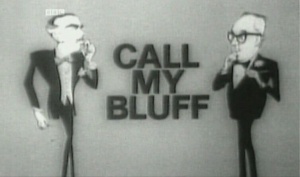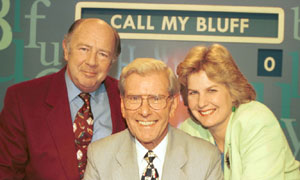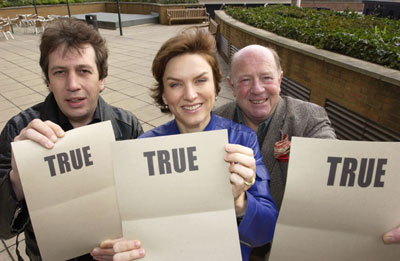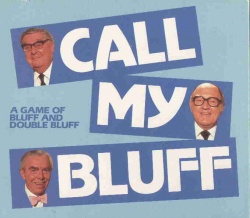Call My Bluff
Contents |
Host
Robin Ray (1965-66)
Joe Melia (1966-67)
Peter Wheeler (1967)
Robert Robinson (1967-88, 1994 special)
Bob Holness (1996-2002)
Fiona Bruce (2003-04)
Angus Deayton (2011 special)
Radio:
Don Davis (1966-7)
Robin Ray (1967)
Peter Haigh (1969)
Co-hosts
Team captains:
Frank Muir (1965-67, 1970-88, 1994 special)
Robert Morley (1965-66)
Alan Melville (1966)
Patrick Campbell (1966-68, 71-79)
Kenneth Williams (stand in for Frank Muir; 1967)
Jimmy Edwards (1967)
Michael Flanders (1967-68)
Kenneth Horne (1968)
Drusilla Beyfus (1968-9)
Fyfe Robertson (1969)
Geoffrey Wheeler (1970-71)
Arthur Marshall (1980-88)
Joanna Lumley (1994 special)
Alan Coren (1996-2004)
Sandi Toksvig (1996-2002)
Rod Liddle (2003-04)
Team captains (radio):
Peter Jones (1966-7)
Wynford Vaughan-Thomas (1966-7)
Fyfe Robertson (1969)
Humphrey Lyttelton (1969)
Fenella Fielding (permanent panellist on Robertson's team, 1969)
Michael Trubshawe (permanent panellist on Lyttelton's team, 1969)
Broadcast
BBC2, 17 October 1965 to 22 December 1988 (541 episodes in 25 series)
BBC Home Service, 6 October 1966 to 26 September 1967 (30 episodes in 2 series)
BBC Radio 4, 25 November to 23 December 1969 (5 episodes in 1 series)
Special: BBC2, 16 April 1994
BBC Pebble Mill for BBC1, 13 May 1996 to 18 June 2004 (469 episodes)
bbc.co.uk webcast, 5 to 6 March 2011 (24 Hour Panel People)
Synopsis
DING! And the word is 'Call My Bluff'. Vic?
"Well, in prehistoric times, fish used to be able to talk. In English! They also used to keep pets, one of which was called a 'Bluff'. Now, when a friend fish says 'Hello fish! can you call my bluff for me?' he wants you to call his pet. Sadly, fishes have lost the ability to talk nowadays."
Very good Vic. Sandi?
"'Ha ha ha! I'm Danish! Anyway, one day, a synonym for someone's agent was a 'Bluff', thereby, ha ha! when you got someone to call your agent you quite literally got them to 'Call My Bluff'. Ha!"
And finally Phillippa?
"Actually it's none of those, in fact it isn't a word, merely a phrase. It is a saying, originating from Sweden, for your best friend's wife-in-law."
So is it a way of calling fish pets over, a synonym for an agent or a word game on the BBC? Nick?
"Well actually I wouldn't have written this if I didn't know what it was, and I'm quite sure it's Vic's."
Ran on BBC2 from 1965 to 1988, usually with Robert Robinson hosting and/or Frank Muir captaining (usually both). A special episode was made in 1994 for BBC2's 30th birthday, airing as part of a theme night called "An Evening In with David Attenborough", with Robinson and Muir reprising their roles and Joanna Lumley serving as the opposing captain. Probably not coincidentally, the show returned full-time two years later, now on BBC1 and in daytimes, with Bob Holness in charge and Alan Coren and Sandi Toksvig as captains. The Holness/Coren/Toksvig version of the show worked brilliantly since the two captains had an excellent rapport and were always able to score points over one another (usually in Sandi's favour).
The show was officially axed in 2002, only to be revived just a few months later with Holness and Toksvig replaced by Fiona Bruce and Rod Liddle; while unannounced at the time, Holness suffered a severe stroke that year and had to be replaced. While Fiona was very good as hostess, sadly Rod really did not get on with Alan and the quality of the show suffered as a result of both Toksvig's departure and the lack of rapport between Coren and Liddle, and it never fully recovered, which was a real shame. One final episode aired in 2011 for 24 Hour Panel People, since which this hasn't returned (although BBC4 repeated BBC2 episodes from 12 August to 4 November 2024 alongside Going for a Song and later Face the Music).
Key moments
There were the inevitable laughs when (mildly) risque words cropped up. Examples included 'Cockamaroo' (meaning 'Russian bagatelle'), 'Checkarsey' (the material from which check is made), 'Wiliwili' (a type of coral-coloured tree found in the tropics), 'Dik-Dik' (a kind of antelope), 'Joinpee' (a move in ballet), 'Dickcissel' (a type of small American bird) and 'Knorcock' (the Norse word for 'next'). On Robinson's last episode, the first word was 'Effinge', a word meaning 'to shape or delight'. (Which you're supposed to pronounce 'eff-ange'. Robinson thought it was 'effing'. Cue uncontrollable giggles from the audience and a look of disgust from a disgruntled Robinson.) One 1974 episode featured the word 'Cumming', a vessel used to collect overflowing froth when brewing beer, which needless to say was much funnier in 2024...
Actress Phyllida Law seemed to struggle with her true and bluff cards, especially on one occasion when she had the true definition and could not find the right card, before eventually finding the right one (with a bit of help from Alan Coren).
PANIC!!!
Other guests occasionally struggled in this way, although not quite so dramatically or comically - two examples were Brian Blessed and the former Howard's Way actress Jan Harvey. On at least three occasions, a panellist pulled out a 'bluff' card when in fact he/she had the true definition - Tony Robinson and Professor Heinz Wolff both did so 'live', so to speak, while the actress Kate Gartside did so in an outtake - a technician actually came over to pull out the correct card for her - this latter footage had obviously been edited out.
On another occasion, the aforementioned Professor Heinz Wolff provided an amusing interlude by challenging Sandi Toksvig's (his own team captain, might we add) definition of the word 'Whulc'. Toksvig was telling one of her superbly tall tales, claiming in this one that she'd had to stand trial as a witch after going on a cycling holiday wearing a forward-pointing hat that lowered wind-resistance and Wolff argued that the hat would have to point backward in order to lower wind-resistance. This made Toksvig laugh so much that she struggled to get the rest of the definition out (a very rare occurrence for her), but she eventually managed to state that the word meant 'which', ("like the magazine", said Wolff), but not the type of 'witch' that she'd just described - and, after all that, hers was the true definition, wouldn't you know it?
Can you tell "Whulc" one is a bluff?
Some guests suffered the embarrassment (usually taken in good spirit) of failing to identify definitions of words that were relevant to their field of expertise. Alan Titchmarsh was constantly singled out by Sandi for failing to guess gardening-related definitions, which did happen on more than one occasion, although he did guess the correct definition on several other occasions, so perhaps Sandi was not being entirely fair? In any case, we also saw Dr. Mark Porter fail to identify the word 'Bechic' that meant 'cough medicine' and Uri Geller fail to guess the word 'Weirddom', which meant 'the supernatural world', so why did poor Titchmarsh have to take all the flak (albeit friendly flak)?
Titchmarsh vs. Toksvig
Other 'guests' (albeit uninvited ones) that made fairly frequent appearances on the programme were the 'studio flies', as Bob Holness took to calling them. On one occasion, Sandi Toksvig was guessing the correct definition and then said to Alan Coren, "You've got a big bug on your shoulder", and Coren slapped the opposite shoulder, before one of his guests, Terry Waite, kindly flicked said bug off Coren's shoulder and Toksvig couldn't resist adding, "It's because your jacket's the colour of fly-paper". On another occasion, Emlyn Hughes was defining a word and then burst into one of his characteristic giggling-fits - and Coren stated, "He's laughing at me because I've got a fly on my head", then he covered his head with his handkerchief and added, "Tell the fly we take from behind - hang by the thorax!" (or words to that effect). On yet another occasion, it was Holness who had a fly land on him and duly pointed out, "The studio flies do make occasional appearances - but they usually sit on the polished dome" (ie Coren's) and the latter chipped in, "Yes, I'd have had the advantage there - I'd have felt it" (true enough). Oh, and one other piece of fly-related footage (this time seen in an outtake) was when Toksvig was in the process of dismissing one of Coren's definitions and then stated that the latter had a fly on his head. Coren then made a comment about a fly defecating on him and Toksvig's response was, "Well, there you are, then - even the fly knows you're talking a load of old poo!"
Catchphrases
(All the hosts): "...So he/she must own up - true or bluff..." and, if a 'bluff' card was shown, "So who gave the true definition of (whichever word)? - it's got to be there somewhere..."
"...And the next word is (ding) (whatever)...."
(Robert Robinson): "So now, let's meet our first captain - the man with the revolving bow-tie - Frank Muir".
"Now, we'll see if this bell still works (ding) - yes, it does, and it brings up our first word, which is (whatever). Frank and his team will define this word three different ways - two of the definitions are no good - one's all right, and that's the one that Arthur and Co must try and find..."
(Bob Holness): "So, the rules - Alan and his team will define a word three different ways - two are bluffs and one is true - Sandi and her team must try to work out which it is; and the first word today is (ding) (whatever), so, Alan...."
Inventor
Based on an American Goodson-Todman show of the same title. According to Frank Muir in his memoir A Kentish Lad, the American show "was a bit of a shambles, mainly because the bluffs... were so obviously false that it was painfully easy to spot the trues. The show proved not to be to the taste of American viewers and only lasted one season."
Theme music
Ciccolino by Norrie Paramor
Trivia
Call My Bluff was the second UK game show to be broadcast in colour, on 1 October 1967. The comparatively obscure Crossword on 2 beat it by two days.
For a couple of series in 1968-9 the TV show was played as ladies vs. gentlemen, perhaps to give it a point of difference from the concurrent radio version.
Aside from the permanent team captains, other popular and recurring guests in the Coren/Toksvig version included the likes of John Sergeant, Bill Paterson, Barry Cryer, and Bernard Cribbins.
Liddle told the Daily Mail in 2007 that he once cheated on a show by texting his girlfriend who was standing by with a copy of the OED. He claimed that he did so to get back at Alan Coren, whom he believed was also cheating. Coren, however, denied the charge, saying "I haven't ever cheated at anything. And, unlike Rod, I haven't cheated on my wife". As Linda Papadopoulos would charge a packet for saying, it looks like there's a bit of tension between these two. In an interview in Radio Times just before he became the new captain, Liddle described Coren as being 'like a cobra - what's more, a cobra with ESP' - referring, of course, to Coren's uncanny ability to sniff out the true definition against all odds.
Sandi Toksvig was always keen to use various props and/or different styles of wordplay to define her words. On more than one occasion, she'd get Bob Holness to act the male part in a mini-play that she'd have written. She also used puppets on another occasion, firstly getting Bob to bring out his old Blockbusters friend, Harold The Hedgehog. She started off by asking Harold how he was and the latter said, "I'm suffering from 'Resipiscence'" (the word in question) and then one of Alan's guests, the late Tony Banks MP, chipped in, "I'm not surprised - he's got your hand up his bum!" Sandi brought a puppet of her own out to help define her next word and she finally got one of her guests, Dawn French, to bring out yet another puppet. All three puppets 'gave' the definitions of the words and the first two definitions were true, Sandi claiming that 'puppets never lie', except that the last one did. ('Resipiscence', by the way, meant 'repentance for misconduct' - thanks, Harold).
Similarly, on a previous occasion, Sandi brought out a matchbox with a picture of a rabbit in it in order to help define the word 'Elucubration'. She asked Alan's guests, Billie Whitelaw and Brian Blessed, to say magic words to make the rabbit disappear, but neither 'Abracadabra' nor 'Shazam' worked, so Sandi said, "I know the best magic words - Bob Holness!" at which point the cameras went to Bob and Sandi made the rabbit disappear - off-camera, of course. She claimed that the word referred to the act of not revealing the secrets behind magic tricks, and Whitelaw, who was guessing the definition, was so taken with the whole thing that she asked if she could have the 'magic' box in return for voting for Sandi. Sandi was very happy to oblige and said to her guests, "Well, we do need the points", bringing out a 'bluff' card. (The correct definition, by the way, was 'burning the midnight oil').
On another occasion, Sandi actually brought out a bluff card during, rather than after, the definition of a word, while assuring Bob that it was all part of the game. She said that the word ('Vafrous') meant 'deceptive' (or something to that effect), then added, "It's a bluff (showing said card) - or is it?" Ann Widdecombe then guessed at one of Sandi's guest's definitions and was wrong - Sandi actually had the true one (it was a double, if not treble, bluff she had pulled off - and why not?)
There were several themed editions during the Coren/Toksvig/Holness era, including at least two Christmas pantomime editions, which featured panto stars such as Brian Blessed, Lionel Blair, Toyah Willcox, John Inman, and Bonnie Langford, sometimes actually in their panto gear. There was a music-themed edition, in which the guests included Richard Baker, Lesley Garrett and Mike Read and a Red Hair Day Special as well, in which the guests were all red-haired (surprise, surprise): they were Steve Davis, Isla Blair, Dr. Phil Hammond, and Rula Lenska. (Alan, by the way, wore a red wig and Sandi wore a false ginger moustache). In addition, there were Comic Relief Specials (one of them featuring such Comic Relief performers as Jo Brand, Nigel Planer, Arabella Weir and Tony Robinson) and three Children In Need Specials. In the latter, the person who had donated the most to Children In Need would be rewarded by appearing on the show: he/she could bring along a friend or relative, who would be on the opposite team, while the two remaining guest slots would always be filled by Terry Wogan and Ken Bruce. The 1998 special guest was Marjorie Longdin, William Hague's aunt, no less: having won the National Lottery, she had very generously donated much of the money to Children In Need. Her friend (and opponent) was her local vicar, The Reverend Andrew Teale - and both proved delightful and very good at the game. When Marjorie correctly guessed one of Sandi's definitions, Sandi told her admiringly, "No wonder you picked the correct Lottery numbers".
In addition, there were several occasions on which husbands and wives appeared on opposite teams. The late Edward Woodward (well OK, he wasn't late at the time) once appeared on Sandi's team while his wife, Michele Dotrice, was on Alan's - and there was plenty of amusing banter between the two, especially when they guessed (or failed to guess) each other's definitions. On another occasion, James Bolam was on Sandi's team and his wife Susan Jameson on Alan's - once again, the show proved highly entertaining. In addition, frequent guest and Archers actor Charles Collingwood appeared with his wife, Judy Bennett, who was also in said long-running series: however, unlike with the other couples, Collingwood and Bennett were both on the one team, ie Alan's. Another time, a famous father and son (on-screen only in this case) appeared on opposite teams: EastEnders actor Shaun Williamson was on Alan's team and his fellow-actor, Tony Caunter, who played Williamson's father in said soap, was on Sandi's. At one point Sandi joked, "Shaun - let's have a bit of respect for your father", never mind the fact that the two actors weren't actually related in real life.
TV Brain tells us that almost every single one of the first 263 episodes from the first 8 series of the BBC2 era have been wiped from the archives with only 7 of them surviving. These are the episodes that survived:
Series 2: Episode 3
Series 4: Episodes 5 & 38
Series 5: Episodes 3-4
Series 8: Episodes 15-16
All four of the longest-serving team captains (Frank Muir, Patrick Campbell, Arthur Marshall, and Alan Coren) died less than four years after their final episodes were broadcast. Bizarrely, the 7 October 2024 rerun paid tribute to Peter Jay, who had died two weeks earlier, despite most if not all of the participants in that episode having also died in the almost 50 years since it was first broadcast.
Web links
Opening titles from 1970, 1974, 1975, 1980, 1987, 1996, 1999 and 2003 in the BBC Motion Graphics Archive
Pictures
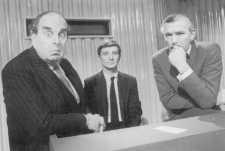 From left to right - Robert Morley, Robin Ray, Frank Muir
From left to right - Robert Morley, Robin Ray, Frank Muir
